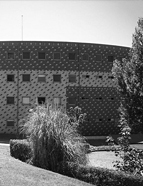

A friend of José Régio (1901-1970, on whom he published a volume of correspondence with the aforementioned Art Historian Flávio Gonçalves) and Manoel de Oliveira (b. 1908), he is a long-standing historical consultant of the latter's filmography.
In turn, Aurélio de Oliveira soon found his monastery to be the object of research in the rural history of the Ancien Régime: Tibães and the Cávado valley. In 1970, he wrote his degree thesis on this monastery (publ. 1973). Working later in Paris with Emmanuel Le Roy Ladurie, he would present an extensive doctoral thesis in 1979 on the property regime in lower Cávado (1680-1820), which unfortunately was never published. Later on, he would dedicate himself incessantly to the Economic History of the Ancien Régime (rents, tithes, prices, viticulture...), with some forays into the social and documentary History of the Baroque. In recent years, and somewhat in the manner of late-António José Saraiva, he devoted himself to the essay on sixteenth century society, using the acts of Gil Vicente as a source.
Francisco Ribeiro da Silva (b. 1940) is from a biologically close but academically posterior generation. Connected to the teaching of Oliveira Ramos, he wrote an important doctoral thesis [1986] on Philippine Porto, which on the one hand represented Porto's equivalent of Coimbra económica e social [Economic and Social Coimbra], 1537-1640 [1971] by António de Oliveira (b. 1931), but on the other, due to its greater focus on institutions and powers, represented the homology in Modern History of what Carvalho Homem and Armindo de Sousa were building in Medieval History. Author of an extensive bibliography on the municipalities of the Ancien Régime - with some emphasis on studies of the Porto region, for which he was responsible for a monograph on the revolt of 1757 -, from the 1980s onwards he also left his name linked to the increased studies on viticulture in the North of the country and particularly the Douro valley. He also studied the problem of literacy in Ancien Régime societies. António Barros Cardoso, who was also interested in themes related to Porto and the Douro wines, to which he dedicated his doctoral thesis (2002), was another to emerge from his teaching; at the beginning of his career, this author studied the History of the Ancient Book, a subject to which he dedicated a thesis for pedagogical aptitude and scientific capacity examinations, addressing the library of Cardinal Saraiva (1993).
